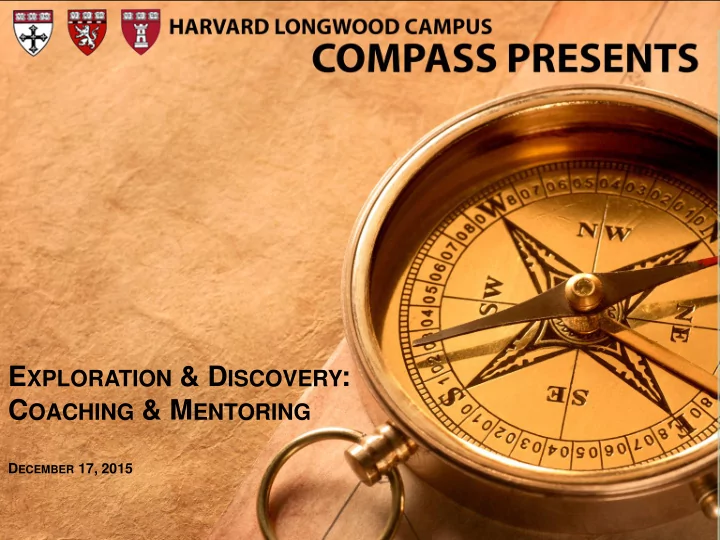

E XPLORATION & D ISCOVERY : C OACHING & M ENTORING D ECEMBER 17, 2015
A GENDA 9:35a Welcome! 9:45a Presence Exercise 9:50a Discussion: Exploration of Coaching & Mentoring 10:45a Panel Discussion: Perspectives on Coaching & Mentoring 11:30a Q & A 11:40a Networking Noon Session Close 2
O BJECTIVES Explore & Discover Coaching & Mentoring Define Terms Compare & Contrast Approaches Inspire Thoughtful Pursuit Skills Application Practical Tools Networking 3
P RESENCE Presence is a core competency for coaching and mentoring, no matter what ‘chair’ you are sitting in (Coach/Coachee, Mentor/Mentee). The ability to give your full attention to the interaction and process is powerful, and can be really hard to achieve and maintain. With intention and practice, we can benefit from bringing our Presence to any situation. 4
D ISCUSSION : E XPLORATION & D ISCOVERY What brought you here today? 5
D ISCUSSION : E XPLORATION & D ISCOVERY 6
C OACHING : W HAT IT IS AND ISN ’ T Coachee: I am seeking positive/transformational change. Coach : I can help you explore & discover.
C OACHING : W HAT IT IS AND ISN ’ T What it is: What it is not: Facilitating Advising Guiding Therapy Feedback Synthesis Fixing
M ENTORING : W HAT IT IS AND ISN ’ T Mentor : I know something or have experience that Mentee: I am seeking to you don't (career, expand my learning, organizational), and I can experience, or network. help you learn and perhaps open doors.
M ENTORING : W HAT IT IS AND ISN ’ T What it is: Advising What it is not: Teaching “I’ll do it for you” Showing
C OACHING & M ENTORING : I NTERSECTION Coach Mentor Increase and sustain effectiveness Increase and sustain through focused effectiveness through action focused action. Coachee Mentee
C OACHING & M ENTORING : E SSENTIALS S KILLS T OOLS M INDSET L ISTENING O PEN - ENDED T RUST A SKING G OOD Q UESTIONS C ONFIDENTIALITY Q UESTIONS SMART R ESPONSIBILITY F OCUSED P RINCIPLES A CCOUNTABILITY A CTION COMPASS O PEN & I NTENTIONAL R ESOURCE L IST C URIOUS C ONNECTION
C OACHING & M ENTORING : E SSENTIALS Characteristics of a productive engagement: Co-develop Realistic Expectations Agree on Concrete Goals Create a Clear Action Plan Learn with Enthusiasm Listen Attentively Express & Foster Genuine Curiosity Communicate Respectfully & Honestly Respect Each Other’s Time Open Yourself to Feedback/Other Points of View Acknowledge & Leverage Differences Share Responsibility for the Engagement Celebrate Milestones Close Well 13 Adapted from the American Corporate Partners Mentoring Handbook & Managers as Mentors: Building Partnerships for Learning (Bell & Goldsmith, 2013)
C OACHING & M ENTORING : W HO ? W HERE ? Be open to a wide, and sometimes unexpected, range of possible resources Organic vs Programmatic (informal vs formal) Peer to peer Higher/lower grade level Similar/different generations, age, style, gender, race, etc. Internal/external colleagues Particular skill or industry, content, or discipline knowledge 14
P REPARING FOR AN E NGAGEMENT Coachee/Mentee What problem am I trying to solve? (I’m stuck vs. interpersonal issue) What could I explore to help me clarify what my question is? What do I want to learn or do better? Who might be able to help me solve it? How do I ask a Coach or Mentor to help me? Coach/Mentor How do I recognize opportunities to play an advocacy role? What do I do if someone asks me to be a Mentor 15 or Coach?
G ETTING S TARTED Intention What is my goal? (current/future state) Attention Where is my focus and energy? (current/future) Awareness What assumptions do I need to test, let go of? Choice What options might I explore? Action What can/will I do? Result What do I hope to learn, accomplish, or do? Adapted from the “Intention Result Map” by Jeremy Hunter 16
S TRUCTURING THE E NGAGEMENT Convey goal(s) Agree to duration, frequency, and mode(s) Establish regular meeting times with cancellation/rescheduling commitments Come to each session prepared Completed homework Topics to discuss Questions to ask Close each session by scheduling the next session, outlining deliverables 17
C LOSING THE E NGAGEMENT Celebrate! Reflection Acknowledging challenges and accomplishments Listing lessons learned Express gratitude Open the door to future check-ins 18
C OACHING & M ENTORING Individual Exercise: Complete Worksheet Q & A 19
P ANEL D ISCUSSION Panelists Zennon Black , Senior Administrative Coordinator at the Harvard T.H. Chan School of Public Health Dawn DeCosta , Director of Research Operations at the Harvard School of Dental Medicine Suzanne Glazer , Director of Executive Coaching and Community Values Liaison for Executive Education at the Harvard Business School Alyson Molloy Hussey , Director of Development at Silver Lining Mentoring Carol Martin , Program Director of the Harvard Catalyst Program for Faculty Development and Diversity Inclusion at the Harvard Medical School 20
T HANK Y OU ! Networking & Swag Happy Winter Recess! 21
W ORKS C ITED Harvard Business Review “Guide to Getting the Mentoring You Need”, 2012 Jeremy Hunter, http://jeremyhunter.net Managers as Mentors: Building Partnerships for Learning, Chip R. Bell & Marshall Goldsmith, Berrett-Kohler, 2013 22
Recommend
More recommend